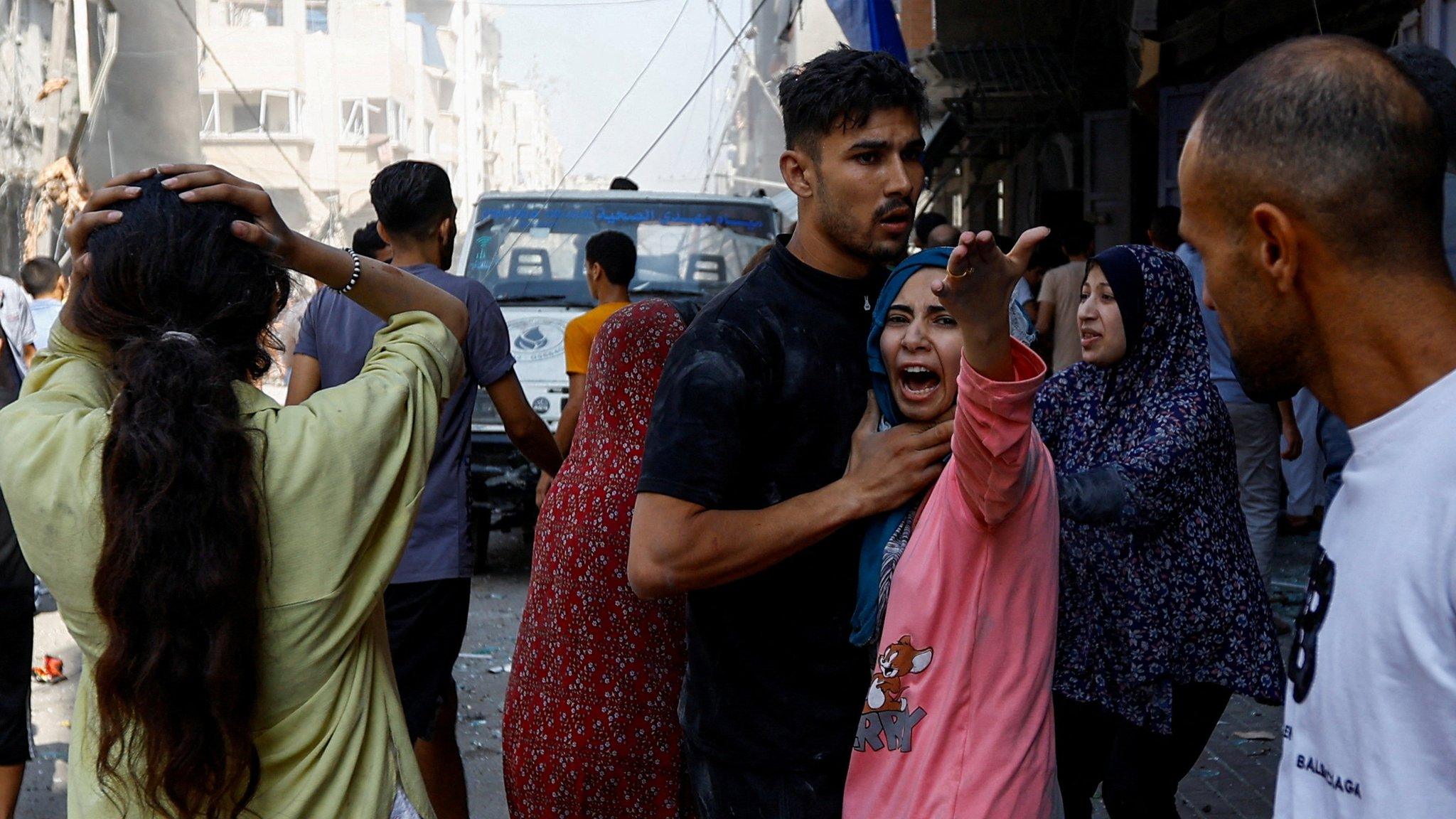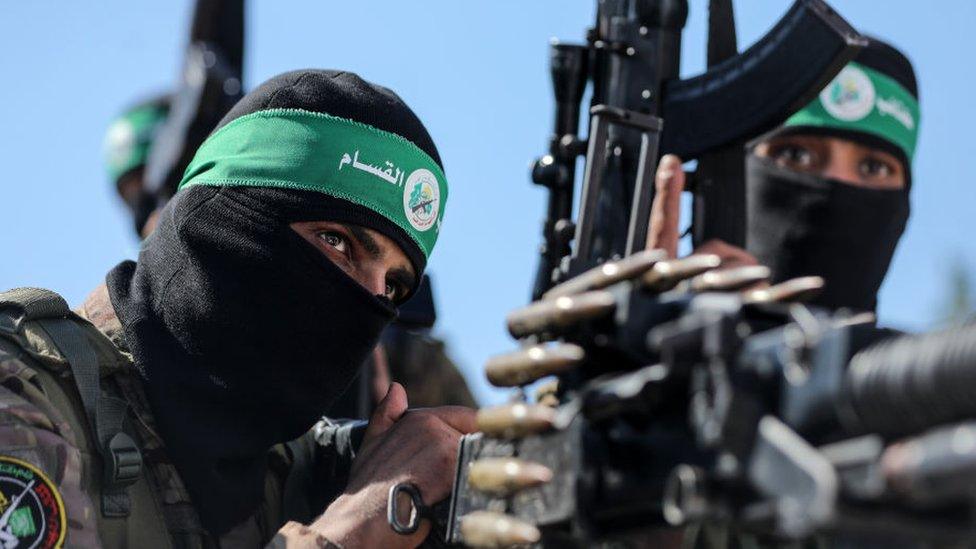Israelis and Palestinians fear worst to come after Gaza violence
- Published
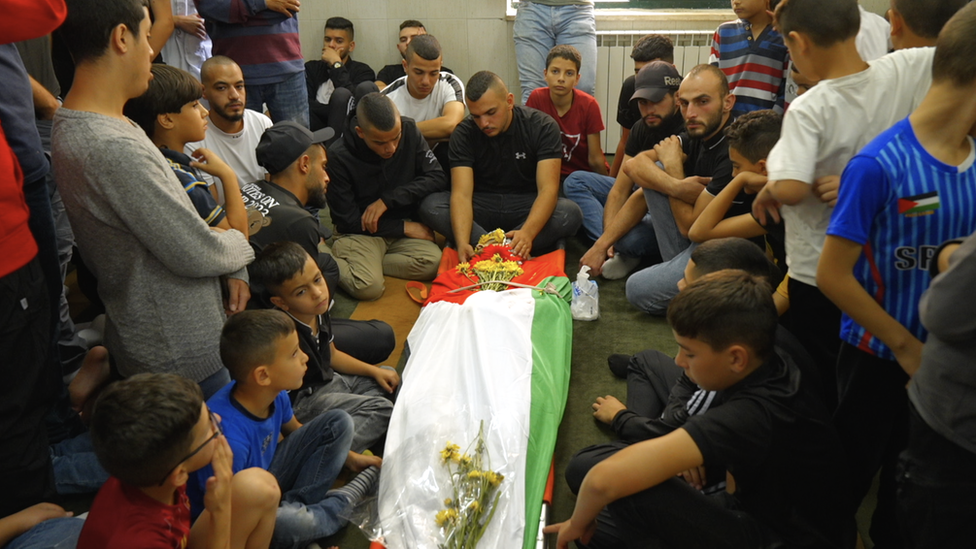
Palestinians at the funeral of Mahmoud Seif who was killed by the Israeli army in the West Bank
In the last few days I have been in southern Israel close to the border with Gaza, deep in the West Bank with hard-line Jewish settlers, and seen the funeral of two young Palestinian men killed by the Israeli army in a raid on a refugee camp.
I've spoken to a former Israeli leader in his office in a Tel Aviv high rise, and a senior Palestinian official in his office in a villa in Ramallah. I have heard an Israeli father at a vigil in Tel Aviv describe how his daughter's birthday cake was still in the fridge when his wife and three young children were taken by Hamas gunmen as hostages.
What I have not been able to do is enter Gaza. Only small convoys of aid, and a handful of Israeli combat troops on raids and reconnaissance, have been able to do that.
More Palestinians and Israelis have been killed in the last two and a half weeks or so than in the entire second Palestinian intifada, or uprising, that lasted from 2000 until it petered out around the end of 2004.
Among the different people I've met, Palestinians and Israelis as well as foreigners, I have had a single clear impression. A sense that the grim old routines that have settled on this long conflict since the end of the last intifada have been swept away by the enormity of events since 7 October, and replaced with a fear that what comes next will be even worse.
The occupied Palestinian territories consist of Gaza and the West Bank, including East Jerusalem. Israel captured them, along with the Golan Heights which it took from Syria, in the 1967 Middle East war.
It was the most sweeping and rapid victory in Israel's history, achieved in only six days. Coming 19 years after Israel's independence war of 1948, which Palestinians call the catastrophe, or al-Nakba, the 1967 war created the cockpit in which the conflict as it stands today is fought.
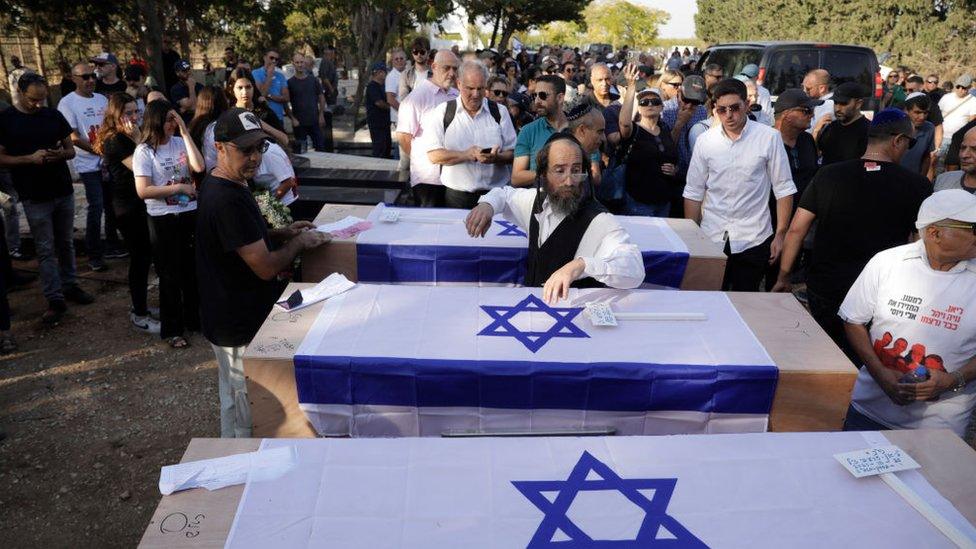
Hamas fighters launched a ferocious assault on Israel on 7 October
Like many others who follow the conflict between Israel and the Palestinians I have felt for the last few years that a major explosion was coming.
On 14 May 2018, I thought that might have started, during the terrible violence that accompanied President Donald Trump's decision to move the embassy of the United States from Tel Aviv to Jerusalem.
President Trump rejected the international convention that Jerusalem's status was unresolved, as both Israel and the Palestinians claim it as a capital. He sided with Israel. Most of Israel's other allies, including the United Kingdom, still have their embassies in Tel Aviv.
As the president's daughter Ivanka Trump opened the embassy, broadcasters split their screens to show terrible violence on the border wire between Israel and Gaza.
Israeli soldiers shot to kill as thousands of Palestinians demonstrated near the fence in what was called "the great march of return" by Hamas. Some of them tried to pull the fence down. Some 59 Palestinians were shot dead and thousands more wounded. Israel's Prime Minister Benjamin Netanyahu, supported by the US, said any country would repel an attack on its border.
The next day was much calmer. A few weeks later the routines of the conflict were re-established. Benjamin Netanyahu, and his allies in the Trump administration, were able to congratulate themselves that the Palestinians had been contained.
Perhaps that was the moment that Hamas started planning a much more devastating way to breach the border and attack Israel, which culminated in the 7 October attacks.
Benjamin Netanyahu's decision - supported by the Americans - to allow the conflict to fester, in the mistaken belief that Israel could keep a lid on it while attending to more important matters, turned out to be a strategic error of monumental proportions.
I walked up the stone staircase to the office of Sabri Saidam in Ramallah, the de facto Palestinian capital of the West Bank. He was educated at Imperial College, London, is an adviser to President Mahmoud Abbas and is a senior member of Fatah, the faction once led by Yasser Arafat that dominates the Palestine Liberation Organisation.
A reaction was coming. It was in the pipeline. Nobody knew what was the scale and the shape of it.
Mr Abbas heads the Palestinian Authority, which was created in the Oslo peace process of the 1990s as a government in the making for an independent state. Now it is at best a job creation scheme with municipal functions, at worst a symbol of inefficiency and corruption. Abbas has not put himself up for re-election since 2006.
Sabri Saidam said they had warned the Americans over Benjamin Netanyahu's belief that he could manage the Palestinians while trying, with American help, to normalise relations with the rich Gulf Arab oil monarchies.
"A reaction was coming. It was in the pipeline. Nobody knew what was the scale and the shape of it. But we have told the Americans many times in meetings that the Palestinians would react and don't leave matters hanging in the balance. You have to intervene. You have to be serious about the peace process."
He rejected the suggestion that Hamas was using people as human shields and now, he said, Israel is engaged in "genocide".
The peace process is shorthand for the years of ultimately failed negotiations that were supposed to end the conflict by creating an independent Palestine alongside Israel. That is the "two-state solution" that President Joe Biden, Prime Minister Rishi Sunak, President Emmanuel Macron and other dignitaries who have been here in the last few weeks have said once again is the only realistic solution.
The trouble with that is that there is no peace process - the Americans last tried, and failed, to revive it ten years ago under President Barack Obama - and the two-state solution has become an empty slogan.
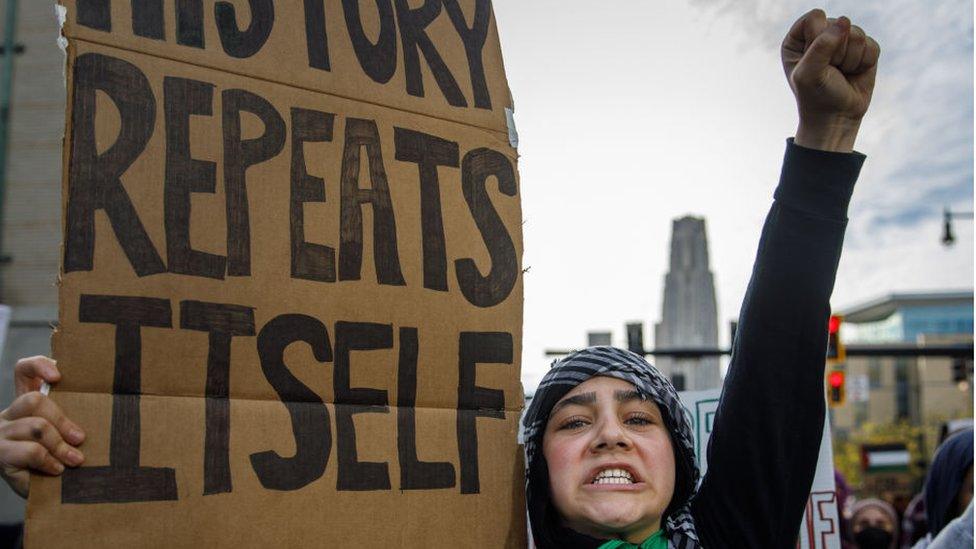
Palestinians and Israelis both live in fear of what happened in their pasts repeating
I went to see the former Prime Minister Ehud Barak in his glass-walled office in a tower in Tel Aviv. In 1973, as a young special forces commander, he planned and led an audacious raid on Lebanon, which they called Operation Spring of Youth. Barak was disguised as a woman, with make-up and a blonde wig, as he led an assassination team that slipped into Beirut to devastating effect.
Mr Barak went on to command the Israeli military and was prime minister from 1999-2001 and later served as defence minister under Benjamin Netanyahu, who in turn had been a junior officer in his special forces unit, the Israeli equivalent of Britain's SAS.
Since then, Ehud Barak and Benjamin Netanyahu have become political enemies. Barak has blamed Netanyahu for mistakes that left Israel vulnerable to Hamas. He believes the prime minister's long years in office will end once the army deals with Hamas.
"Winning the war," Mr Barak told me, "will take time and then the torrent of sweat and decent blood is not going to be something simple… when it's over or half over or there is a situation of whatever kind it would be a volcano of rage, it will erupt, I believe. To remove this government from power."
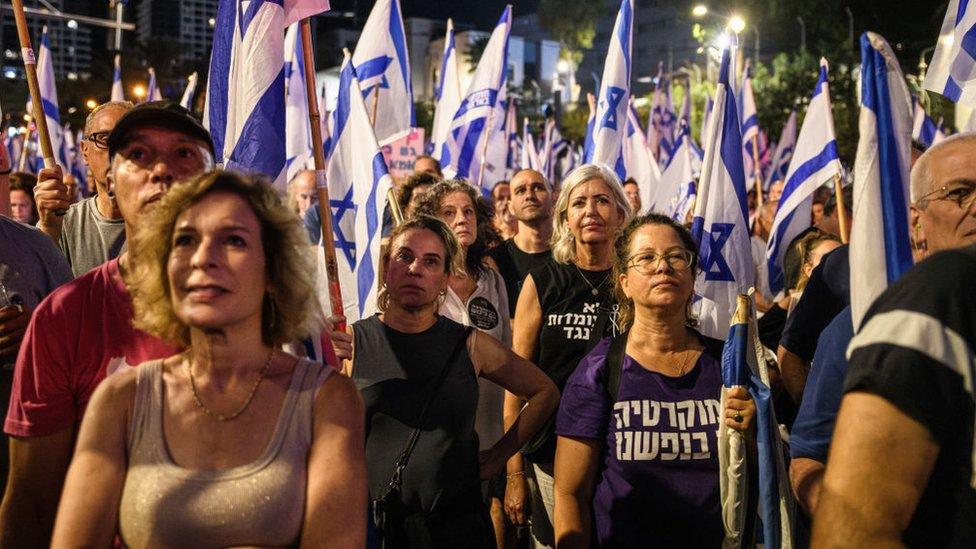
Earlier this year tens of thousands of Israelis were protesting against Mr Netanyahu's government
One reason for Mr Netanyahu's reluctance, up to now anyway, to send ground troops into Gaza is the presence of more than 200 hostages, mostly Israeli civilians. Hamas took them to put pressure on Israel and is succeeding.
Releasing four hostages and talking about freeing many more has become an effective tactic in the psychological war between the two sides. Voices in Israel are getting louder, demanding a halt to any invasion plans until the hostages are free.
Ehud Barak, who believes Israel has to send troops into Gaza to eliminate Hamas, said that hard choices lie ahead for Prime Minister Netanyahu and his war cabinet.
"If there is no other way, we will have to do it, because the alternative is to provide those barbarians and terrorists who made crimes against humanity [with] impunity due to the fact that they massacred, slaughtered probably 1,500 people… A very painful and tough decision might have to be made."

More on Israel-Gaza war
Follow live: Latest updates
Explained: What is happening in Israel and Gaza, and why now?
History behind the story: The Israel-Palestinian conflict

I drove through the West Bank over two days this week, and saw an area that was extremely tense, with Israel in tight control. Thousands of soldiers in combat gear have sealed off Palestinian villages, set up roadblocks and are protecting Jewish settlements, which are regarded as illegal under international law although Israel disputes this.
In an isolated settler outpost on a desolate hilltop outside Hebron, hard line Jewish nationalists carrying weapons told me they were waiting for the chance to use them against Palestinians. Their leader Meir Simcha, who walked round the outpost armed with a large machete in a leather scabbard, said that unlike other Israelis they had not been surprised by the Hamas assault on 7 October. It was a shame, he said, that so many Jews had to die to show mainstream Israel something he believed was self-evident.
"In a war you have a gun and a trigger," Simcha said. "And for those who don't understand yet, we are at war. A war where the other side shows no mercy and we need to do the same. There's no choice."
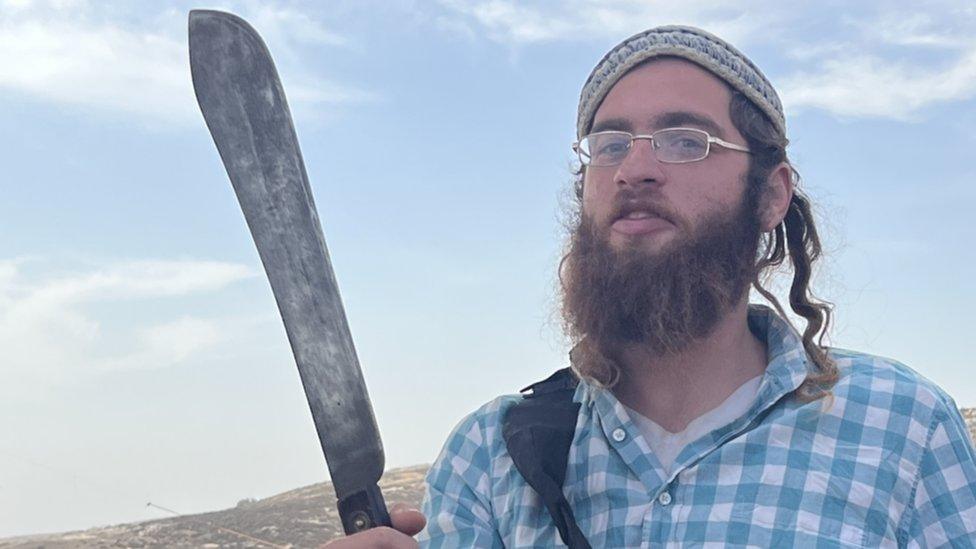
Meir Simcha protects a Jewish settlement in the occupied West Bank with a machete
Further north in the West Bank, the atmosphere in Jalazone refugee camp, just outside Ramallah, was sombre, fearful and angry, as two young men killed in an Israeli army arrest operation were buried. Mustapha al-Ayan - cousin of Mahmoud Seif, one of the dead men who was shot as he threw stones at the Israelis - said the army had not come to arrest suspects but to punish them for what Hamas did on 7 October.
The grave was being filled behind him as he told me: "They are coming to the West Bank to take revenge, because the resistance groups in Gaza have hurt them. So now they are attacking the people in the West Bank. God give mercy to all the martyrs in Gaza and the West Bank."
One fear often expressed by Palestinians is that Israel, in its rage, is using the crisis to try to inflict another Nakba, or catastrophe, on the scale of 1948. The evidence they cite is the way that more than a million Gazans have been forced to flee to the south of the Strip, and the threats made by some Israeli politicians to make Gaza smaller by taking tranches of land to use as buffer zones.
In Ramallah, Sabri Saidam, the Fatah official, talked about a map that Mr Netanyahu produced at the United Nations in September, showing an Israel that included the West Bank and Gaza.
"Everybody has in mind that the very map that Netanyahu carried before the nations at the General Assembly of the UN, in which there was no West Bank and Gaza. So the feel and general mood is actually entertaining the thought that Netanyahu is going after the deportation, the displacement of Palestinians leading up to the annexation of Gaza."
The ghosts of the past shape the mood on both sides. For Israel it is the Holocaust of European Jews at the hands of Nazi Germany. The massacres on 7 October have been called the worst day for the Jews since the Holocaust. The word "selection", that was used to describe the way Jews arriving at death camps were either sent straight to the gas chambers or spared to be worked to death, has been applied to suggestions that deals might be done that release foreign hostages before Israelis.
Palestinians don't share much with Israelis, especially not now, except the shadow of the past and a dread of harder times ahead.
- Published27 February
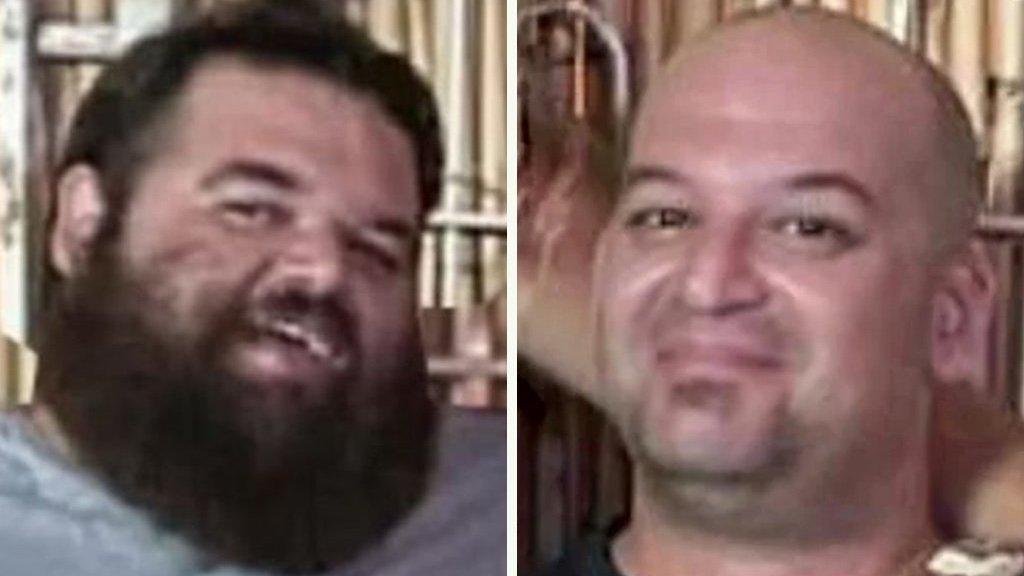
- Published24 October 2023
